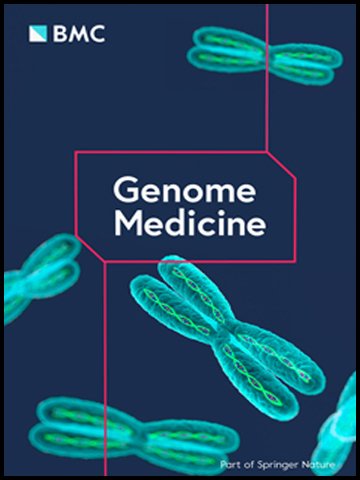前列腺癌中与 DNA 甲基化和雄激素受体相关的种族特异性核心调控和转录组图谱
IF 10.4
1区 生物学
Q1 GENETICS & HEREDITY
引用次数: 0
摘要
前列腺癌是一个重大的健康问题,尤其是在非裔美国人(AA)男性中,他们的发病率和死亡率高于欧裔美国人(EA)男性。要加强临床管理并取得更好的疗效,了解这些差异背后的分子机制势在必行。我们采用多组学方法分析了 AA 族和 EA 族男性的前列腺癌。利用 Illumina 甲基化阵列和 RNA 测序,我们研究了肿瘤和非肿瘤前列腺组织中的 DNA 甲基化和基因表达。此外,我们还利用布尔分析揭示了导致前列腺癌种族差异的复杂网络。在比较肿瘤和邻近非肿瘤前列腺组织时,我们发现DNA高甲基化区域富含PRC2/H3K27me3通路和EZH2/SUZ12辅助因子。在AA男性的前列腺肿瘤中,DNA低甲基化区域富含嗅觉/核糖体通路和不同的辅助因子,包括CTCF和KMT2A。我们发现DNA甲基化与几个雄激素受体(AR)相关基因(包括转录因子GATA家族和TRIM63)的表达存在种族特异性反向关联。这表明在前列腺癌中存在种族特异性的 AR 信号通路失调。为了研究AR抑制对种族特异性基因表达变化的影响,我们生成了针对特定患者的前列腺癌布尔网络。我们的模拟结果显示,长时间的AR抑制会导致TGF-β、IDH1和细胞周期通路的显著失调,尤其是在AA型前列腺癌中。我们进一步量化了全局基因表达的变化,发现与微管、免疫功能和TMPRSS2融合通路相关的基因表达存在差异,尤其是在AA男性前列腺肿瘤中。这些通路的富集以种族特异性的方式与疾病进展风险的改变显著相关。我们的研究揭示了AA和EA男性前列腺癌生物学基础的独特信号网络,为针对特定种族群体的临床管理策略提供了潜在的启示。针对AR和相关通路的研究尤其有助于解决在AA和EA男性中观察到的前列腺癌结果差异。对这些已确定途径的进一步研究可能会开发出个性化的治疗方法,以改善不同种族背景的前列腺癌患者的预后。本文章由计算机程序翻译,如有差异,请以英文原文为准。
Race-specific coregulatory and transcriptomic profiles associated with DNA methylation and androgen receptor in prostate cancer
Prostate cancer is a significant health concern, particularly among African American (AA) men who exhibit higher incidence and mortality compared to European American (EA) men. Understanding the molecular mechanisms underlying these disparities is imperative for enhancing clinical management and achieving better outcomes. Employing a multi-omics approach, we analyzed prostate cancer in both AA and EA men. Using Illumina methylation arrays and RNA sequencing, we investigated DNA methylation and gene expression in tumor and non-tumor prostate tissues. Additionally, Boolean analysis was utilized to unravel complex networks contributing to racial disparities in prostate cancer. When comparing tumor and adjacent non-tumor prostate tissues, we found that DNA hypermethylated regions are enriched for PRC2/H3K27me3 pathways and EZH2/SUZ12 cofactors. Olfactory/ribosomal pathways and distinct cofactors, including CTCF and KMT2A, were enriched in DNA hypomethylated regions in prostate tumors from AA men. We identified race-specific inverse associations of DNA methylation with expression of several androgen receptor (AR) associated genes, including the GATA family of transcription factors and TRIM63. This suggests that race-specific dysregulation of the AR signaling pathway exists in prostate cancer. To investigate the effect of AR inhibition on race-specific gene expression changes, we generated in-silico patient-specific prostate cancer Boolean networks. Our simulations revealed prolonged AR inhibition causes significant dysregulation of TGF-β, IDH1, and cell cycle pathways specifically in AA prostate cancer. We further quantified global gene expression changes, which revealed differential expression of genes related to microtubules, immune function, and TMPRSS2-fusion pathways, specifically in prostate tumors of AA men. Enrichment of these pathways significantly correlated with an altered risk of disease progression in a race-specific manner. Our study reveals unique signaling networks underlying prostate cancer biology in AA and EA men, offering potential insights for clinical management strategies tailored to specific racial groups. Targeting AR and associated pathways could be particularly beneficial in addressing the disparities observed in prostate cancer outcomes in the context of AA and EA men. Further investigation into these identified pathways may lead to the development of personalized therapeutic approaches to improve outcomes for prostate cancer patients across different racial backgrounds.
求助全文
通过发布文献求助,成功后即可免费获取论文全文。
去求助
来源期刊

Genome Medicine
GENETICS & HEREDITY-
CiteScore
20.80
自引率
0.80%
发文量
128
审稿时长
6-12 weeks
期刊介绍:
Genome Medicine is an open access journal that publishes outstanding research applying genetics, genomics, and multi-omics to understand, diagnose, and treat disease. Bridging basic science and clinical research, it covers areas such as cancer genomics, immuno-oncology, immunogenomics, infectious disease, microbiome, neurogenomics, systems medicine, clinical genomics, gene therapies, precision medicine, and clinical trials. The journal publishes original research, methods, software, and reviews to serve authors and promote broad interest and importance in the field.
 求助内容:
求助内容: 应助结果提醒方式:
应助结果提醒方式:


